Mrs. T asked me last night if Harcourt had published a large-print edition of Pops: A Life of Louis Armstrong. I explained that such editions were published by specialty houses and that I wasn’t aware that Pops had gotten the large-print treatment.
This morning I recalled our conversation, booted up my MacBook, and learned, much to my surprise, that a large-print paperback edition of Pops was published by Thorndike Press in May. You can order it for yourself or a partially sighted friend by going here.
Archives for September 2010
TT: Second stanza
Mrs. T and I encountered some difficulties when we took a vacation earlier this summer, most of which, I freely confess, were of my making. Having had only modest experience with full-fledged vacations, I crammed too many activities and too much travel into not enough time, making us completely exhausted by the time we returned home. We then launched into the usual frenzied coast-to-coast round of visits to summer theater festivals, which ran us both down still further. At some point along the way, it occurred to me that what we needed was a second vacation–one during which we would do nothing whatsoever. To this end, I hacked eight precious days out of my schedule, and last Monday we packed our bags, hopped in the car, and headed west.
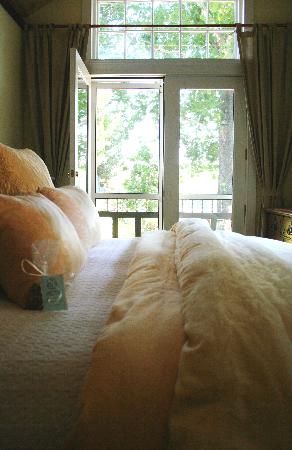 Never let it be said that nobody learns from experience. This time around I arranged things so that I had no shows to see, no deadlines to hit, and no “improving books” (thank you, Jeeves) to read in my spare time. The only books that I brought with me on the trip were a half-dozen mysteries by Rex Stout and Georges Simenon. I packed my laptop and checked my e-mail more or less regularly, but I kept my communication with the outside world down to a fairly bare minimum, and I didn’t write a single word for publication, or for this blog, while Mrs. T and I were on the move.
Never let it be said that nobody learns from experience. This time around I arranged things so that I had no shows to see, no deadlines to hit, and no “improving books” (thank you, Jeeves) to read in my spare time. The only books that I brought with me on the trip were a half-dozen mysteries by Rex Stout and Georges Simenon. I packed my laptop and checked my e-mail more or less regularly, but I kept my communication with the outside world down to a fairly bare minimum, and I didn’t write a single word for publication, or for this blog, while Mrs. T and I were on the move.
Longtime readers won’t be surprised to hear that we divided our time between Bridgeton House in Upper Black Eddy, Pennsylvania, and Ecce Bed and Breakfast in Barryville, New York, two lovely, immaculately run inns situated near different stretches of the Delaware River. I’ve raved about both places before–Mrs. T and I actually honeymooned at Ecce–and I knew that our hosts would treat us like crowned royalty. We slept well, ate well, and spent long spans of time listening to the Delaware River flow. Otherwise we emulated the sound advice that Jack Nicholson failed to take in Chinatown: we did as little as possible.
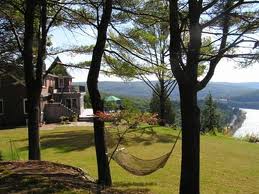 The effects of all this masterly inactivity can be summed up in ten happy words: I can’t remember the last time I felt so rested. I knew I was tired, but I didn’t fully understand how tightly wrapped I was until the knots came undone and I started to relax. By the time we returned to Connecticut late yesterday afternoon, I’d shed my cares and felt like myself again–or, rather, like the self I ought to be. It helped that I took further care to arrange things so that I won’t be going back to work again until Saturday, when I’ll return to New York to see a preview of Edward Albee’s new play. Until then I mean to ease back into the world an inch or two at a time.
The effects of all this masterly inactivity can be summed up in ten happy words: I can’t remember the last time I felt so rested. I knew I was tired, but I didn’t fully understand how tightly wrapped I was until the knots came undone and I started to relax. By the time we returned to Connecticut late yesterday afternoon, I’d shed my cares and felt like myself again–or, rather, like the self I ought to be. It helped that I took further care to arrange things so that I won’t be going back to work again until Saturday, when I’ll return to New York to see a preview of Edward Albee’s new play. Until then I mean to ease back into the world an inch or two at a time.
And then? The trick will be to figure out to unwind in the interstices of my working life. I don’t expect to be very good at it. I have half a lifetime of bad habits to unlearn, and some “lessons” have to be learned over and over again. But at least I’ve found out how it feels to be completely unwound, thanks to Mrs. T and our kindly hosts at Bridgeton House and Ecce. May their efforts not be in vain!
TT: Almanac
“We mustn’t forget how quickly the visions of genius become the canned goods of the intellectuals.”
Saul Bellow, Herzog
TT: Fifteen albums in fifteen minutes
A number of friends have invited me to play the following game that’s been making the rounds in cyberspace:
The rules: Don’t take too long to think about it–choose fifteen albums you’ve heard that will always stick with you. List the first fifteen you can recall in no more than fifteen minutes. (These aren’t favorite albums, necessarily, just the fifteen that will always stick with you.)
I drew my list up with as little forethought as possible. When I was finished, I realized that in all but a couple of instances, these were the albums that introduced me to the music of the artists who made them.
I subsequently got to know some of those artists personally. It was on Maria Bachmann’s Fratres, for example, that I first heard the music of Paul Moravec, with whom I was to collaborate on The Letter sixteen years later.
Here goes:
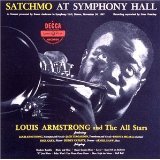 • Louis Armstrong, Satchmo at Symphony Hall
• Louis Armstrong, Satchmo at Symphony Hall
• Maria Bachmann and Jon Klibonoff, Fratres
• The Band, The Band
• Rosanne Cash, Black Cadillac
• Duke Ellington, Never No Lament: The Blanton-Webster Band
• Bill Evans, Conversations With Myself
• Vladimir Horowitz, The Historic Return
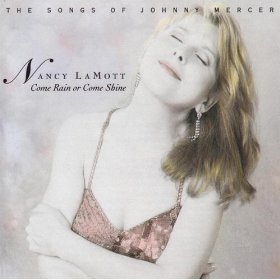 • Nancy LaMott, Come Rain or Come Shine: The Songs of Johnny Mercer
• Nancy LaMott, Come Rain or Come Shine: The Songs of Johnny Mercer
• Mabel Mercer, The Art of Mabel Mercer
• Pat Metheny, Bright Size Life
• Stephen Sondheim, A Little Night Music
• Luciana Souza, Brazilian Duos
• Steely Dan, Aja
• Joseph Szigeti and Béla Bartók, A Sonata Recital by Joseph Szigeti and Béla Bartók
• The Who, Live at Leeds
TT: Just because
Dave McKenna plays “A Beautiful Friendship” at the Northsea Jazz Festival in 1980:
TT: Almanac
“Murder is unique in that it abolishes the party it injures, so that society has to take the place of the victim and on his behalf demand atonement or grant forgiveness; it is the one crime in which society has a direct interest.”
W.H. Auden, “The Guilty Vicarage”
PLEASE OMIT MUSIC (OR ELSE)
“What is it about music that gets true believers so hot and bothered? The British novelist Anthony Powell put his finger on it when he spoke in A Buyer’s Market of the ‘sensual essence’ of the fine arts. This is especially true of music, which is both incorporeal–you can’t see or touch it–and fundamentally sensual in its appeal…”
CAAF: The Galaxie 12
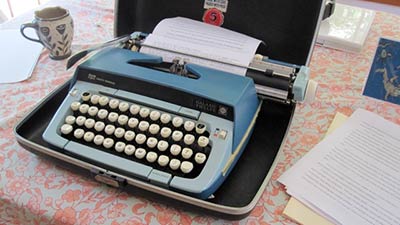
A few months ago I told my friend R. that I’d thrown out the novel I’d been working on for the past few years after realizing that it was hopelessly botched and started something new. A few days later he left this typewriter, a manual Smith-Corona, on my porch as a loan. Truth to tell, while I appreciated the gesture, the typewriter remained in its case until the other week when I got it out for some note-taking. I liked it, invested in a fresh ribbon, and now it’s my new “orgasm pen.”
The two main things I like about the typewriter: You have to move forward — no endless revision with the delete key — and it’s not connected to the Internet. Also, the dog thumps her tail every time the carriage returns even when she’s mid-nap.
Related: Maud recently uncovered this trove of BBC author interviews . There are lots of amazing ones, but my favorite so far is Daphne Du Maurier’s as it opens on her at her typewriter, which would be the standard “the author at work” establishing shot except for DuMaurier’s super-strong finger-punching technique on the keys.
